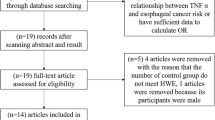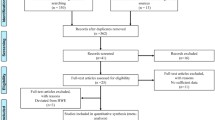Abstract
Published studies on the association between FAS 1377G>A polymorphism and breast cancer susceptibility were inconclusive. To derive a more precise assessment of the association, a meta-analysis of published studies was performed. PubMed, Embase, and Web of Science were searched for eligible studies on the association between FAS 1377G>A polymorphism and breast cancer susceptibility. Five studies with a total of 2,905 cases and 3,090 controls were included into the meta-analysis. Overall, FAS 1377G>A polymorphism was significantly associated with increased susceptibility to breast cancer (for AA versus GG: odds ratio (OR) = 1.39, 95 % confidence interval (95 % CI) 1.12–1.72, P = 0.003; for AA/GA versus GG: OR = 1.18, 95 % CI 1.06–1.32, P = 0.004; for AA versus GG/GA: OR = 1.28, 95 % CI 1.05–1.56, P = 0.015). Subgroup analysis by ethnicity found that FAS 1377G>A polymorphism was significantly associated with increased susceptibility to breast cancer in Asians (for AA versus GG: OR = 1.48, 95 % CI 1.16–1.89, P = 0.001; for AA/GA versus GG: OR = 1.24, 95 % CI 1.06–1.46, P = 0.008; for AA versus GG/GA: OR = 1.35, 95 % CI 1.08–1.69, P = 0.008), but the association was not found in Caucasians. Therefore, the findings of the meta-analysis suggest that FAS 1377G>A polymorphism is significantly associated with increased susceptibility to breast cancer in Asians.




Similar content being viewed by others
References
Jemal A, Bray F, Center MM, Ferlay J, Ward E, Forman D. Global cancer statistics. CA Cancer J Clin. 2011;61:69–90.
Forouzanfar MH, Foreman KJ, Delossantos AM, Lozano R, Lopez AD, Murray CJ, et al. Breast and cervical cancer in 187 countries between 1980 and 2010: a systematic analysis. Lancet. 2011;378:1461–84.
Oostendorp LJ, Stalmeier PF, Donders AR, van der Graaf WT, Ottevanger PB. Efficacy and safety of palliative chemotherapy for patients with advanced breast cancer pretreated with anthracyclines and taxanes: a systematic review. Lancet Oncol. 2011;12:1053–61.
Platt J, Baxter N, Zhong T. Breast reconstruction after mastectomy for breast cancer. CMAJ. 2011;183:2109–16.
Morrow M, Waters J, Morris E. MRI for breast cancer screening, diagnosis, and treatment. Lancet. 2011;378:1804–11.
Narod SA. Hormone replacement therapy and the risk of breast cancer. Nat Rev Clin Oncol. 2011;8:669–76.
Reis-Filho JS, Pusztai L. Gene expression profiling in breast cancer: classification, prognostication, and prediction. Lancet. 2011;378:1812–23.
Spencer SL, Sorger PK. Measuring and modeling apoptosis in single cells. Cell. 2011;144:926–39.
Tabas I, Ron D. Integrating the mechanisms of apoptosis induced by endoplasmic reticulum stress. Nat Cell Biol. 2011;13:184–90.
Wilson NS, Dixit V, Ashkenazi A. Death receptor signal transducers: nodes of coordination in immune signaling networks. Nat Immunol. 2009;10:348–55.
Imai Y, Kouzmenko A, Kato S. Targeting Fas/FasL signaling, a new strategy for maintaining bone health. Expert Opin Ther Targets. 2011;15:1143–5.
Crew KD, Gammon MD, Terry MB, Zhang FF, Agrawal M, Eng SM, et al. Genetic polymorphisms in the apoptosis-associated genes FAS and FASL and breast cancer risk. Carcinogenesis. 2007;28:2548–51.
Zhang B, Sun T, Xue L, Han X, Lu N, Shi Y, et al. Functional polymorphisms in FAS and FASL contribute to increased apoptosis of tumor infiltration lymphocytes and risk of breast cancer. Carcinogenesis. 2007;28:1067–73.
Krippl P, Langsenlehner U, Renner W, Koppel H, Samonigg H. Re: polymorphisms of death pathway genes FAS and FASL in esophageal squamous-cell carcinoma. J Natl Cancer Inst. 2004;96:1478–9. author reply 1479.
Wang W, Zheng Z, Yu W, Lin H, Cui B, Cao F. Polymorphisms of the FAS and FASL genes and risk of breast cancer. Oncol Lett. 2012;3:625–8.
Hashemi M, Fazaeli A, Ghavami S, Eskandari-Nasab E, Arbabi F, Mashhadi MA, et al. Functional polymorphisms of FAS and FASL gene and risk of breast cancer—pilot study of 134 cases. PLoS One. 2013;8:e53075.
Cochran WG. The combination of estimates from different experiments. Biometrics. 1954;10:101–29.
DerSimonian R, Laird N. Meta-analysis in clinical trials. Control Clin Trials. 1986;7:177–88.
Mantel N, Haenszel W. Statistical aspects of the analysis of data from retrospective studies of disease. J Natl Cancer Inst. 1959;22:719–48.
Mahfoudh W, Bouaouina N, Gabbouj S, Chouchane L. FASL-844 T/C polymorphism: a biomarker of good prognosis of breast cancer in the Tunisian population. Hum Immunol. 2012;73:932–8.
Kurian AW, Gong GD, John EM, Johnston DA, Felberg A, West DW, et al. Breast cancer risk for noncarriers of family-specific BRCA1 and BRCA2 mutations: findings from the breast cancer family registry. J Clin Oncol. 2011;29:4505–9.
Miao H, Verkooijen HM, Chia KS, Bouchardy C, Pukkala E, Laronningen S, et al. Incidence and outcome of male breast cancer: an international population-based study. J Clin Oncol. 2011;29:4381–6.
Barnes DR, Barrowdale D, Beesley J, Chen X, James PA, Hopper JL, et al. Estimating single nucleotide polymorphism associations using pedigree data: applications to breast cancer. Br J Cancer. 2013;108:2610–22.
Dahabreh IJ, Schmid CH, Lau J, Varvarigou V, Murray S, Trikalinos TA. Genotype misclassification in genetic association studies of the rs1042522 tp53 (arg72pro) polymorphism: a systematic review of studies of breast, lung, colorectal, ovarian, and endometrial cancer. Am J Epidemiol. 2013;177:1317–25.
Zhang G, Zeng Y, Liu Z, Wei W. Significant association between Nijmegen breakage syndrome 1 657del5 polymorphism and breast cancer risk. Tumour Biol. 2013. doi:10.1007/s13277-013-0830-z.
Qiu LX, Shi J, Yuan H, Jiang X, Xue K, Pan HF, et al. FAS −1,377 G/A polymorphism is associated with cancer susceptibility: evidence from 10,564 cases and 12,075 controls. Hum Genet. 2009;125:431–5.
Zhang Z, Xue H, Gong W, Wang M, Yuan L, Han S. FAS promoter polymorphisms and cancer risk: a meta-analysis based on 34 case–control studies. Carcinogenesis. 2009;30:487–93.
Conflicts of interest
None
Author information
Authors and Affiliations
Corresponding author
Rights and permissions
About this article
Cite this article
Li, K., Li, W., Zou, H. et al. Association between FAS 1377G>A polymorphism and breast cancer susceptibility: a meta-analysis. Tumor Biol. 35, 351–356 (2014). https://doi.org/10.1007/s13277-013-1048-9
Received:
Accepted:
Published:
Issue Date:
DOI: https://doi.org/10.1007/s13277-013-1048-9




